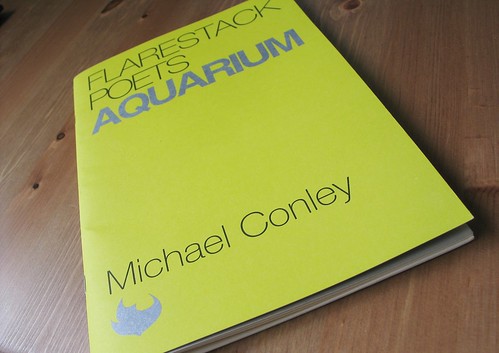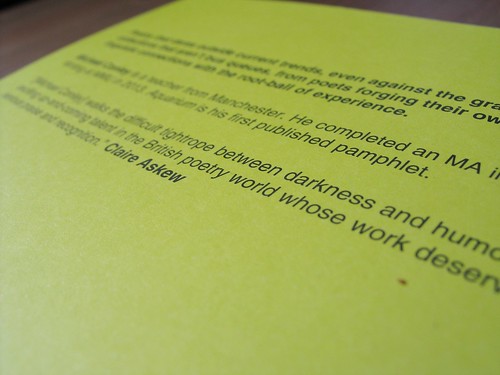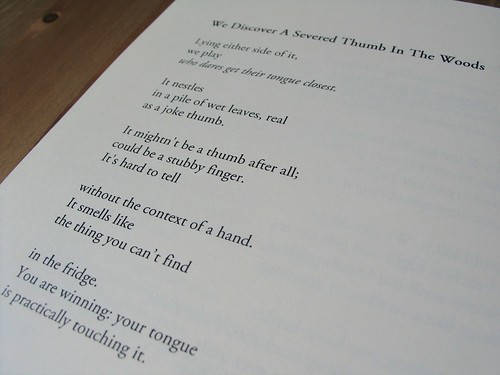
So, after weeks of chat about this project, and having received over 140 expressions of interest and over 120 actual poetry submissions, I’m very pleased to announce the final line-up for the STARRY RHYMES: 85 YEARS OF ALLEN GINSBERG chapbook, edited by myself and Lovely Boyfriend. It was a damn hard slog, going over and over those 120+ poems, whittling things down to our desired target of “around thirty.” A lot of stuff we really liked had to fall by the wayside — a lot of top-notch established poets were turned away. But we’re confident that we’ve ended up with a really strong, varied clutch of poems from established names and young pretenders alike.
The chapbook will be launched on Friday 3rd June at the Forest Hall (upstairs at the Forest Cafe), Edinburgh. A good number of these fine folks will be performing their works, along with the Ginsberg poems they were inspired by. We’ll be screening some footage of the late, great man himself, and hopefully bringing you some damn good music into the bargain. Keep the date in your diaries — further details will be announced very soon! In the meantime, feast your eyes upon this excellent line-up, and keep a few quid aside to make sure you get your copy of STARRY RHYMES when it appears!
Alec Beattie, who responded to To The Body
Alec Beattie is the Edinburgh-based editor at Duality, a writer and fledgling performance poet.
Kevin Cadwallender, who responded to Improvisation in Beijing
Kevin Cadwallender is a writer who lives in Edinburgh but is a Yakker. His writing has appeared on telly, the radio, the internet, in books, in films, in songs, on tape, CD and DVD. He has a pathological dislike for biographies like this and would prefer not to blow his own trumpet as he is much more at home on the flugelhorn.
He is a vegetarian, atheist, romantic, with GSOH but doesn’t want a date with anyone. He is Red Squirrel Press’s Scottish Editor and had many children all of whom are his.
Michael Conley, who responded to Why Is God Love, Jack?
Michael Conley is a 26-year old schoolteacher from Manchester. He is currently studying part-time for an MA in Creative Writing at Manchester Metropolitan University. He was selected to read during Season 2 of “Carol Ann Duffy And Friends” at the Royal Exchange Theatre in 2011, and has been published in a variety of magazines an ezines including Cadaverine and Sentinel Literary Quarterly. He was the winner of the 2010 Weasdale Poetry Prize.
Morgan Downie, who responded to The End
Morgan’s first full collection, stone and sea, was published in March 2010. He is a poet, short story writer, artist, and a passionate mountain biker. He has had a varied career in healthcare, and he has written all his life.
Cal Doyle, who responded to Dream Record: June 8, 1955
Cal Doyle is a poet lives in Cork, Ireland. His poetry and criticism has appeared in various small print ‘zines, online publications and is forthcoming in Young and Restless, an anthology of younger poets published by Tumble Press. He can be contacted for work or general banter at cal.doyle@hotmail.com
Sally Evans, who responded to America
Sally Evans is a poet widely published in Scottish and English magazines and has published several books including The Bees, The Honey Seller and Bewick Walks to Scotland. She edits the broadsheet Poetry Scotland and lives in Callander.
Suzannah Evans, who responded to Personals Ad
Suzannah Evans lives in Leeds and likes to travel on foot. She is studying for an MA in Writing at Sheffield Hallam University. She has had poems published in magazines including The Rialto, Iota and Brittle Star. She is poetry editor for Cadaverine, an online magazine for under-25s and runs writing workshops at the Stanley and Audrey Burton Gallery in Leeds.
Eddie Gibbons, who responded to Research
Eddie Gibbons openly admits to being more Ryanair than debonair.
Growing up on a Council Estate in Huyton, Liverpool, he didn’t have neighbours, he had witnesses. Being a Scouser, he had to learn English as a Foreign Language, which made his readings inadvertently entertaining due to his weird pronunciation of werds such as bewk, kewk and kewkbewk. In order to correct his speech defect, he defected to Aberdeen in 1980. That did the trick – he spiks affy fine nou, ken. Eddie works as a Draughtsman in a factory near Dyce airport, for a quick getaway. He’s also written a few poetry books.
Karen Head, who responded to In My Kitchen in New York
Karen Head is the author of Sassing (WordTech Press, 2009), My Paris
Year (All Nations Press, 2008) and Shadow Boxes (All
Nations Press, 2003). Her poetry appears in a number of national and international journals and anthologies. Her most recent digital project was a collaborative exquisite corpse poem created via Twitter while she stood atop the Fourth Plinth in Trafalgar Square as part of Antony Gormley’s One and Other Project; her poetry project, “Monumental” was detailed in a TIME online mini-documentary. She teaches at Georgia Tech and serves on the Poetry Atlanta Board.
Joe Heap, who responded to Homework
Joe Heap was a Foyle Young Poet in 2004 and won the 2010 Alastair Buchan Prize from the University of Glasgow.
Colin Herd, who responded to Night Gleam
Colin Herd was born in Stirling in 1985, and now lives in Edinburgh. His first collection, “too ok”, was published by BlazeVOX Books in 2011 and a slim chapbook, “like”, by The Knives Forks and Spoons Press in 2010. He reviews regularly, including poetry for Chroma Journal, art for Aesthetica and fiction for 3:AM Magazine. He co-edits “anything anymore anywhere”, a poetry journal and small press.
Ryan Lamon, who responded to Written on a Hotel Napkin: Chicago Futures
You can see more of Ryan Lamon’s poetry at elzorrito.deviantart.com
Melissa Lee-Houghton, who responded to Prophecy
Melissa Lee-Houghton is the author of A Body Made of You published by Penned in the Margins. Her poetry and short fiction have appeared in Tears in the Fence, Poetry Salzburg Review, Succour and Magma. She is a regular reviewer for The Short Review.
Matthew MacDonald, who responded to A Strange New Cottage in Berkeley
Matthew Macdonald divides his time between poetry, film-making, becoming an Avenger and finding the time to distill some of the living essence of Neil Gaiman. This is his first submission to a poetry magazine – he blogs occasionally at lastmanstanza-ing.blogspot.com
Aonghas Macneacail, who responded to In back of the real
Award-winning poet in English, Scots and Gaelic, Aonghas MacNeacail reflects that “being Gael rather than gay, I also grew up in a marginalising society. Ginsberg’s exuberantly affirmative defiance provides a wonderfully positive model as well as great poetry.”
Kevin MacNeil, who responded to Howl Part III
Kevin MacNeil is a multi-award-winning writer. A poet, novelist, playwright and cyclist from the Outer Hebrides, he now lives in London. MacNeil has held a number of prestigious international writing residencies and has taught Creative Writing at the universities of Uppsala and Edinburgh. His books include A Method Actor’s Guide to Jekyll and Hyde (Polygon), The Stornoway Way (Penguin), Love and Zen in the Outer Hebrides (Canongate) and These Islands, We Sing (Polygon).
Marion McCready, who responded to The Bricklayer’s Lunch Hour
Marion McCready lives in Dunoon, Argyll with her husband and two young children. Calder Wood Press published her debut pamphlet, Vintage Sea, earlier this year.
Alex McDonald, who responded to A Strange New Cottage In Berkeley
Alex MacDonald was born in Essex in 1986 and currently lives and works in London. He runs the blog SelectedPoems and runs the monthly night ‘Selected Poems at the V&A Reading Rooms’ which champions independent poetry publications. His work has been published in Clinic 2, No. Zine, OOXXOO and Talk Dirty to Me.
Colin McGuire, who responded to Howl Part II
A thin 28 year old Glaswegian man, touch giddy in the head, sometimes poet of mangled forms and dirty prose, sporadic drummer, drunken grammarian, waffler, painter using crayons, lover, hater, learner, teacher, pedestrian, provocateur, wanderer, confronter of shadows, irritating whine. ‘Riddled with Errors’ is his first collection of poetry and miniature stories which can be bought from Notes From a Glaswegian Immaturity, where you can also read more of his words and some reviews of other writers. He currently lives in Edinburgh and occassionally can be heard reading in pubs and cafes. Send him love or hate to his email – colmcguire@hotmail.com
Andrew McMillan, who responded to Stanzas: Written at Night in Radio City
Andrew McMillan was born in 1988. His work has appeared widely online and in print and a debut pamphlet, every salt advance, was published by Red Squirrel Press in 2009. October 2011 will see the release of a second pamphlet from Red Squirrel and a place in the upcoming Salt Book of Younger Poets.
Dan Mussett, who responded to Hymmnn
Dan Mussett’s poetry has been published by Read This Magazine and was Highly Commended in the Sentinel Literary Quarterly poetry competition in 2010. His poem “Anonymous” was adapted into a short film for the this collection project.
Stephen Nelson, who responded to Think Tank Rhymes
Stephen Nelson was born in Motherwell, Scotland in 1970. He is the author of Flylyght (Knives, Forks, and Spoons Press) and two chapbooks of visual poetry. He blogs visual poetry and other delights at afterlights.
Kenneth Pobo, who responded to A Supermarket in California
Kenneth Pobo has a new chapbook out from Thunderclap Press called Closer Walks. He teaches creative writing and English at Widener University in Pennsylvania . Catch his radio show, Obscure Oldies, on Saturdays from 6-830pm EST at wdnrfm.com.
Tracey S Rosenberg, who responded to The Lion For Real
Tracey S. Rosenberg was recently awarded a New Writers Award from the Scottish Book Trust. Her debut novel, The Girl in the Bunker, is forthcoming from Cargo Publishing. She has previously published poetry in Chapman, Anon, Poetry Scotland, The Frogmore Papers, and New Writing Scotland. She likes cats of all kinds, not just lions.
Daniel Ryan, who responded to Research
Daniel Ryan was born in London to Irish parents, and he grew up in the Irish countryside. Daniel currently lives in Dublin. He studied Philosophy at Undergraduate level and Journalism at Postgraduate level. Daniel’s twin loves are music and writing. He has been writing poetry since his late teens, and volunteers at the Irish Writers’ Centre in his spare time.
Sarah Stanton, who responded to A Supermarket in California
Sarah Stanton is a birdwatcher, Sinophile, poet, translator and geek. She lives in China but dreams in English.
Sarah Quigley, who responded to Prophecy
Sarah Quigley is a writer, illustrator and graphic designer based in Dublin, Ireland. Her poetry has featured in publications and performances at home and abroad, and recently decorated Dublin’s streets as part of the Upstart project. Sarah has just released her first chapbook The Unfinished House, which she illustrated and hand-bound. Best of all, as co-founder of Milk and Cookie Stories, one of Dublin’s most successful regular arts nights, Sarah has brought cookies and stories to the people of Dublin.
Ryan Van Winkle, who responded to America
Ryan Van Winkle is currently Reader in Residence at the Scottish Poetry Library and Edinburgh City Libraries. He runs a monthly “Literary Cabaret” called The Golden Hour and is an Editor at Forest Publications. His work has appeared in New Writing Scotland, The American Poetry Review, AGNI and Northwords Now. In 2010 he won Salt’s Crashaw Prize and his first collection is Tomorrow, We Will Live Here (2010).
Francis Wasser, who responded to America
Born 1988, Dublin, Ireland, Francis Wasser is a Dublin based artist, poet and curator. Wasser is currently studying an MFA in sculpture at the National College of Art and Deign.
Gemma White, who responded to Dream Record: June 8, 1955
Gemma White is a Melbourne-based poet who creates and edits Velour magazine. She has been published in Voiceworks, page seventeen and Visible Ink. She had poetry included in The Green Fuse, The Picaro Poetry Prize’s 2010 publication. Gemma also offers a poetry manuscript feedback service, which allows poets to get constructive criticism on their work at any time of year for a small fee. For more info: http://onlywordsapart.wordpress.com/
Jensen Wilder, who responded to To The Body
Jensen Wilder is 25, he currently lives in the North West in the little seaside town of Meols with two cocker spaniels. He enjoys photography but likes writing better. He has never completed a crossword or won a game of scrabble. Read him at When I Swear, I Censor Myself
Chrissy Williams, who responded to Those Two
Chrissy Williams is the coordinator for the Saison Poetry Library’s magazine digitisation project. She is also Joint Editor of Poetry Digest, the world’s finest edible poetry journal.
ABOUT THE EDITORS
Claire Askew is the founding editor of Read This, a grassroots literary zine which ran from 2007 to 2010. She is also the editor of Read This Press, a poetry micropress which has so far produced two single-poet collections (You Old Soak, 2008 and Sharks Don’t Sleep, 2009), and two anthologies of poetry, Skin Deep: an anthology of poems on tattoos and tattooing (2008) and Masters: Poetry from the University of Edinburgh MSc Creative Writing Class of 2009 (2009). Claire works as a Lecturer at Edinburgh’s Telford College and tutors Creative Writing privately and at the University of Edinburgh, where she is also reading for a PhD. Her own poetry has appeared in Poetry Scotland, The Edinburgh Review and The Guardian, and her first pamphlet collection is The Mermaid and the Sailors (Red Squirrel, 2011). Her nonfiction writing has appeared in The Herald and The Observer. She blogs at onenightstanzas.com and Girlpoems.
Stephen Welsh is a lecturer at Stevenson College Edinburgh, and also works with The Princes Trust in and around Edinburgh. He has a MA in English Literature from the University of St Andrews and has studied Creative Writing with Kathleen Jamie, John Burnside and Douglas Dunn. Stephen is a poet specialising in visual and concrete work. In March 2011, Stephen placed second in the inaugural this collection ‘friendly’ poetry slam. He is currently working on Revolution of the Sun, a current-affairs-meets-vispo project in which he creates one poem every day for a year using newspaper clippings. Revolution of the Sun will eventually become a trilogy of poetry pamphlets, due for publication with Red Squirrel Press in 2011 and 2012. Stephen is also currently working on a short play for the National Theatre of Scotland’s Five Minute Theatre project. He blogs at Concrete Void.
Copies of STARRY RHYMES will be available for pre-order very soon, and the chapbook will be officially launched on Friday 3rd June 2011 — watch this space!
(Photo)
 Subscribe to ONS!
Subscribe to ONS! 





